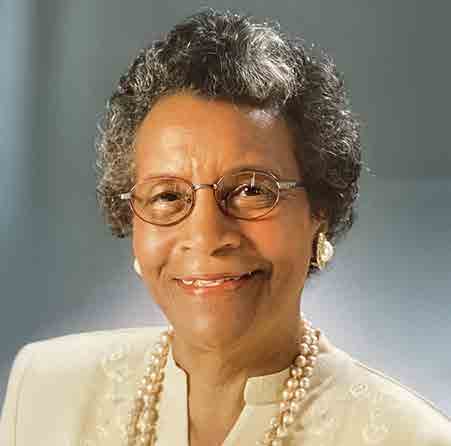Roberta Jones-Booth was a woman of many talents. As her sons Martin C. Jones and Talbert S. Jones, Jr. lovingly describe her, Roberta was a devoted mother, talented seamstress, fashion icon, thought leader, community organizer, and trusted neighborhood voice.
Born in a small town in South Carolina, Roberta grew up on a farm surrounded by her family. Like many Black southerners of her generation, Roberta moved north to Philadelphia during the Great Migration hoping to find more economic opportunity. She would later meet her husband, Talbert S. Jones, Sr., at a party while he was stationed at nearby Fort Dix in New Jersey. The couple eventually relocated their family to Columbus’ South Side, where Roberta became well known in the community for her activism, commitment to justice, and service to others. She even convened a “Kitchen Cabinet” of local women who regularly met to discuss issues impacting the community.
“My mother would always say, ‘You win with people.’ That was her favorite phrase,” her son Talbert said. “She had a lot of people who loved her and believed in her, because they knew how reliable she was.”
Roberta’s grit, determination, and ability to connect with people would prove essential after her neighborhood experienced a dangerous environmental disaster. On the morning of September 10, 1997, the South Side was suddenly rocked by an explosion at the nearby Georgia-Pacific chemical plant, forcing local residents and businesses to evacuate. The blast, which could be felt from two miles away, leaked the harmful toxin phenol-formaldehyde into the air, exposing community members to a substance known to cause nausea, dizziness, difficulty breathing, and burning of the eyes, throat, and skin. Tragically, one employee of the plant was killed in the explosion.

PICTURED: Roberta Jones-Booth. Photo courtesy of Martin C. Jones.
Notably, the 1997 tragedy was not the first alarming incident involving Georgia-Pacific’s Columbus plant.
Thirteen years earlier, on May 7, 1984, a failure of the plant’s reactor caused a cloud of chemicals to escape the facility and travel half a mile northeast of the plant.
Soon after, neighbors began reporting that they were experiencing respiratory issues and that local vegetation was dying. Less than a year and a half later, the Georgia-Pacific plant was the site of another disaster when 20,000 gallons of chemicals leaked from a ruptured storage tank.
Watching her family and neighbors be repeatedly exposed to harmful chemicals and frustrated by the lack of accountability, Roberta went into action. Joining forces with other South Side residents, Roberta helped file a class action lawsuit against Georgia-Pacific, charging negligence and seeking to recover for damages caused by the 1997 explosion.
Despite nearly two decades of delays, obstacles, and setbacks, Roberta and her neighbors persevered. The lawsuit eventually resulted in a $22 million settlement and the creation of a public health program to monitor residents’ health—a monumental achievement for a community long concerned about the dangers of the chemical plant and high rates of cancer in the neighborhood.
As Martin explained, Roberta’s determination throughout the legal proceedings was fueled by her resolve to do the right thing. “Doing well by others was an important part of her fiber, especially when it was in service of doing the right thing,” Martin said.
Although Roberta passed away in 2003, her legacy carries on. Inspired by her love and unwavering support of her community, family and friends—including Roberta’s son, the late Michael S. Jones, her daughter, the late Tina Jones Ellis, and her second husband, the late Carl L. Booth—established the Roberta Jones Booth Scholarship Fund in 2004. The scholarship supports students who are graduating seniors from Marion Franklin High School or who reside within the Marion Franklin Civic Association boundaries.
 |
Martin—who serves on the Roberta Jones Booth Scholarship Fund selection committee alongside two of Roberta’s friends, Shirleen Anderson and Constance Oliver—says the scholarship fund is a way to continue giving back to the neighborhood Roberta was so deeply devoted to.
“She always had a passion for education and making a way for a future generation, one that she wouldn’t be able to see,” Martin said. “She was always that person who, if a door opened, she would bring several people with her.”
“Because of my mother and my father, I knew that you could be ordinary and do extraordinary things,” Talbert added. “That’s how I would describe my mother. She was an ordinary woman who I witnessed over and over again do extraordinary things.”